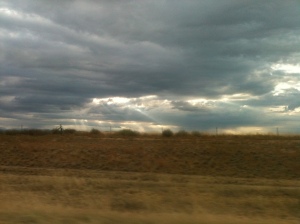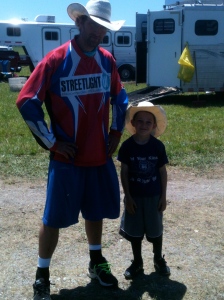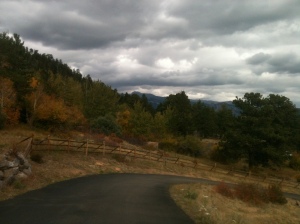 It is surprising at times, though it really shouldn’t be. If you can read this then you are old enough to know that life changes in an flash. In a split second things can go from good to bad. It is commonplace in the life that we live, yet we are still caught off guard.
It is surprising at times, though it really shouldn’t be. If you can read this then you are old enough to know that life changes in an flash. In a split second things can go from good to bad. It is commonplace in the life that we live, yet we are still caught off guard.
I was speaking at a camp last weekend where my cell service is spotty at best. Across my facebook came questions about an injury sustained by a stock contractor/bullfighter, that I have worked for and looked up too for years. He was fighting bulls last weekend when a bull stepped on his chest, crushing his sternum. He went from code yellow to code red in the ambulance on the way to the hospital. Everything was taken care of and he is recovering well now but in a split second, so much had changed for him.
So much can happen in a second…
When the diagnosis comes down as cancer? When a car crash claims a life? When layoffs happen? When kids rebel? When drug addiction or alcoholism is discovered? How do you respond?
Things can change so quickly.
Elijah is fresh off God’s victory over the prophets of Ba’al and has witnessed the power of God in his corner versus the prevailing worldview of the day (1 Kings 18.21). He has also out run a chariot, being carried along by the “power [yad] of the Lord”. (Literally, the “hand of the Lord” carried him as he ran ahead of Ahab. [1 Kings 18.41-46]) All of the exploits on Mt. Carmel gets back to Jezebel. Her answer:
“May the gods deal with me, be it ever so severely, if by this time tomorrow I do not make your life like that of one of them.”
He had all the prophets of Ba’al killed (1 Kings 18.40) and now Jezebel make it known that she plans to make him like them within the day.
Has life ever had you on cloud nine, succeeding at whatever your hands find to do, excercising your giftedness and playing a role in the kingdom…only to blindside you? Muck you out?
My story is long and complicated. To spare you many of the details, I felt like I was running on all 8 cylinders last year for the first time in a long time. The middle school ministry at the church was thriving. Not only did we have a huge number of students, but we had a plan to introduce them to a God who loved them very much. Our students were very different from what I was used too, but for the first time we had a plan to purposefully meet them, on their terms with the Gospel. Our adults who helped on Wed night were committed, loved students that were at times hard to love, and were being used by God in ways I doubt they ever envisioned…something that I came alive being part of. Our High School youth were working on Archaeology stuff in a ministry called the Forum. They were writing articles about archaeology, interacting with the Biblical text and soaking up knowledge about the Bible. They spent a weekend seeing the Dead Sea Scrolls which is not real high on most students to do list. In youth group they were finding and utilizing their gifts, their worship styles, and embracing community at a level I had never seen.
Then it came crashing down.
My brother-in-law, our children’s pastor, went to our Senior pastor and two elders and told them that the church needed to fire me. I got a text that night asking me to speak with our pastor and an elder the next day. When I went into the office, I was told that I would be put on probation. The elders were to be briefed of this at the beginning of October. When that October meeting came, our Senior pastor meet with me the morning of the meeting and expressed that probation was not working and he was requesting that the elders fire me. The elders arrived that night, with no prior knowledge of issues, received a handout detialing my transgressions, and voted to fire me. One elder refused to let me go and refused to let that vote count. A month later, the elders met with me to hear my side of the story. Three weeks later, two elders met with me after church to ask for my resignation. A month later, the night before my birthday (it was a rough week), I sat down with two elders and negotiated my termination. A month after that, the Church was informed by the Elders, that I was leaving the ministry for other options. The onus was on me. I sat in the balcony as kids and parents asked me why I was leaving and wasn’t able to tell them i was asked to go. A week later, the elders tried to clear it up…I wasn’t there.
During this time, as life was falling apart around me and a ministry that I had given my all to over the last 7 years was “going a different direction”, I thought back to all the success that God had given us and desperately tried to reconcile it with my current situation.
Elijah was broken and ran for his life. In the desert, where God tends to make and form his people (Moses [Ex. 3.1]; the people of Israel [Deut. 2.1]; David [1 Sam 23.14, 24-25; 25.4]), Elijah reaches the point where life has crashed down around him and he shows his response. He sits under a broom tree and prays. Elsewhere he has prayed to God (1 Kings 17.20; 18.36) in tense circumstances (1 Kings 17.20; 18.36), but those prayers don’t seem as dire as this:
“I have had enough, Lord. Take my life; I am no better than my ancestors.” (1 Kings 19.4)
All of Elijah’s ancestors fell by the sword (1 Kings 19.10) and Elijah now wants to be like them. In exhaustion he falls asleep that night. He is certainly no the only one who felt this way. He joins a distinguished list of the great men in Scripture who have not wanted to go on living. Job, Jonah, Isaiah, Solomon, Jeremiah, Moses, and now Elijah (Ex. 32.32; Num. 11.14; Jer. 15.10; 20.14; Job 3.11; 7.16; Jonah 4.3, 8-9; Isaiah 6.5; Ecc. 2.17), each questioned why they are living instead of dead.
The next day, after God fed him twice, Elijah headed to the Mountain of God, Horeb, where Moses had met with God. The journey was to take 40 days and nights. (1 Kings 19.8) That is a long journey on foot. A long time to think, ponder, and contemplate what brought him to this point. This is a crock-pot story in a world of microwave stories. Crock-pot’s are slow cooking. When resolution isn’t just around the corner, Crock-pot stories are the way to go. God has some work to do with Elijah. And this journey and time spent on the mountain, is the slow-cooking crock-pot environment that Elijah needs at this point.
Matt, the bullfighter I wrote about earlier, was there at the beginning of my crock-pot time (of which I am still in the middle of). The weekend after our Sr. Pastor suggested the Elders fire me, he hired me to work a few high school rodeos. As we talked about life and rodeo, it was the perfect start to healing that I needed.
This journey was about Elijah’s healing. I know where he is coming from. Shame, discouragement, questioning life? Jesus said that it wouldn’t be easy…but we are convinced serving God should be the path to a better life. Life changes though in an instant. Elijah wanted to die when the tides turned. I wanted to die when the tides changed. My crock-pot is now a year old. Many great conversations about the desert have come from the firing. I take solace in the fact that God wasn’t done with Elijah. The journey was just the beginning of Elijah’s healing and preparation for his next role.
Maybe you are stuck in the crock-pot? Maybe you are on a journey towards healing and restoration? You might be at the end of your rope, exhausted from doing the right thing only to be ran over? Maybe you are on the mountain top alongside Elijah (1 Kings 18.42) and things are going well…but sometime you will be with Elijah in the desert (1 Kings 19.4) and you need to think back to this?
Elijah went from the top to the bottom in a hurry, but our God is a God of the highs and lows, the mountain tops and valleys, in times of prosperity and famine. God is God at all times and in all situations, never giving up on his servants and refusing to stop working in them…it takes some convincing to be thankful for that at times.
God Why Am I Still Alive–Burnout in Ministry Study




